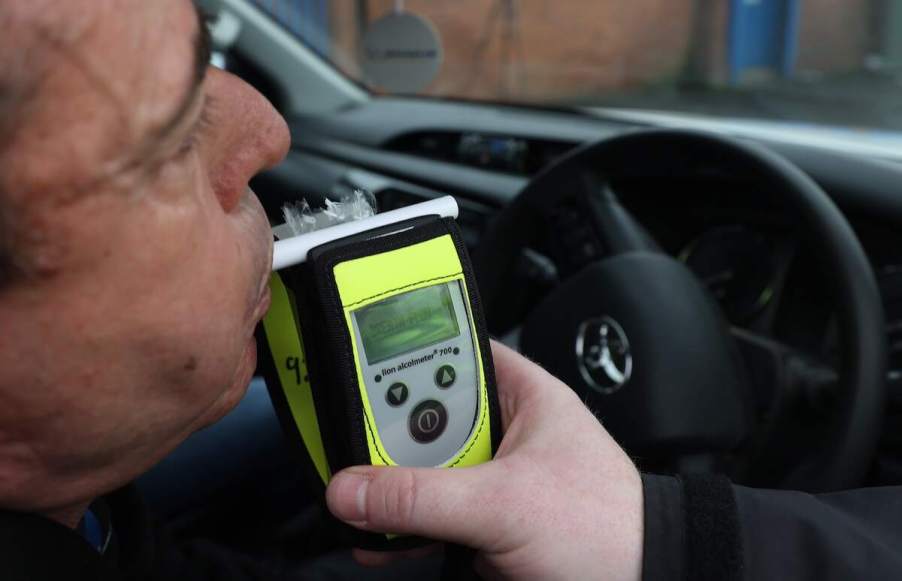
What Happens During a Breathalyzer Test, aka Breath Alcohol Test?
Alcohol is to blame for a third of U.S. traffic fatalities (13,384 people in 2021 alone, per the NHTSA). Impaired driving is the deadliest preventable cause of car accidents in the United States. One of law enforcement’s main tools to prevent drunk driving is the breath alcohol test, better known as a breathalyzer test. Here’s a simple guide, including what to expect during a breathalyzer test, whether you can refuse a breathalyzer during a traffic stop, and if it’s better to do a breathalyzer or give blood.
How is a breathalyzer test performed?

A breath alcohol test is relatively straightforward. Multiple types of breathalyzer devices exist, but all do the same job of testing blood alcohol levels by analyzing a subject’s breath.
Generally, a breath alcohol test takes place during a conventional traffic stop. Police officers ask the motorist to blow into a tube or inflate a balloon attached to the breathalyzer. The device tests the collected breath to determine the subject’s blood alcohol content (BAC). Generally, 0.08% BAC or higher is illegal nationwide; however, various states have lower limits for other individuals, such as drivers under 21.
Police often use breathalyzers in addition to other field sobriety tests. Officers might also ask motorists to walk in a straight line, touch their fingers to their nose, or recite parts of the alphabet.
What are the 2 types of breath alcohol tests?
In broad terms, there are two types of breath alcohol tests: preliminary alcohol screening tests (PAS) and evidential breath tests (EBT). PAS and EBT differ in the technology used and their roles in traffic policing.
PAS are small, portable tests used during traffic stops. They’re convenient and versatile, but their accuracy is limited. EBTs are more complex systems, usually housed in police stations, that give a more reliably accurate reading. Generally, officers use PAS as a first-line tool for determining whether a driver could be intoxicated. EBTs are more often used after arrest to confirm field results.
Can you refuse a breathalyzer test?

Legally, a breath alcohol test constitutes a police search. In the United States, police searches are governed by strict legal rules. Breath tests have their own legal status, which varies by state.
Some lawyers might say you have a legal right to refuse a breathalyzer, but that statement can be misleading. According to Responsibility.org, every state but Wyoming imposes civil and/or criminal penalties for refusing a field sobriety test. Common consequences include the following:
- Being held in jail until a judge can hear the case or the police obtain a warrant for an alcohol test
- Having a refusal used against the driver in court
- License suspension or revocation
Crucially, these penalties are highly unpredictable. Refusing a BAC test has different consequences based on state laws and the test circumstances. Even the National Highway Traffic Safety Administration (NHTSA), the federal agency responsible for highway safety regulations, acknowledges the following:
“The penalties in each state for failing or refusing a BAC test cannot be categorized in a straightforward manner due to the complexity of state alcohol-impaired-driving laws and the differences in how these laws are prosecuted and adjudicated.”
In short, there’s no easy answer for the consequences of refusing a breathalyzer. Possibilities range from a traffic ticket to arrest pending felony charges, and there’s no real way of knowing which will govern your case.
Ironically, there is one situation in which refusing a breathalyzer test is almost always a better idea than taking one: If the motorist is sure they’ve been driving drunk. Refusing a field sobriety test comes with consequences, but they’re usually less severe than a DWI conviction. Regardless, driving drunk can lead to severe penalties that could affect a driver’s life for months, years, or indefinitely.
Is it better to do a breathalyzer or give blood?
American law treats breathalyzers and blood alcohol tests as two different kinds of search. Per the U.S. Supreme Court, taking blood requires a warrant. Breath tests do not. Refusing a blood test requires the police to get a warrant for the test before imposing penalties. Conversely, refusing a breath test comes with automatic penalties — no warrant required.
Regardless of the circumstances, blood alcohol tests are more reliably accurate than breath tests. So, if you fail a breathalyzer test but believe you are sober, a blood test could help your case. However, if the blood test confirms you are over the legal limit, those results could strengthen the case against you.





